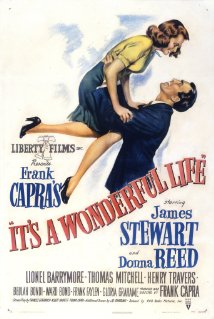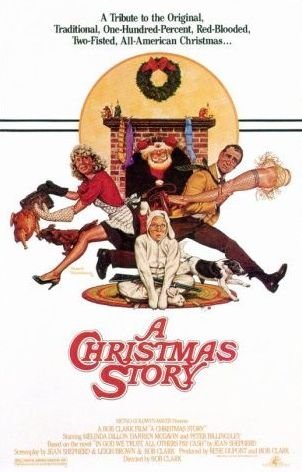 The Stix Family has in recent years developed a Christmas season tradition of watching the classic Christmas movies, It’s a Wonderful Life (1946) and A Christmas Story (1983).
The Stix Family has in recent years developed a Christmas season tradition of watching the classic Christmas movies, It’s a Wonderful Life (1946) and A Christmas Story (1983).
It’s a bittersweet tradition, because each movie evokes a feeling of irreplaceable loss.
It’s a Wonderful Life is the story of George Bailey (Jimmy Stewart) and fictional Bedford Falls, New York. The brilliant, hardworking, yet penurious pillar of the community has always sacrificed his personal ambitions on behalf of others.
The film takes for granted a certain sense of propriety and family values. Thirteen minutes into the picture, George and Bert the cop (Ward Bond) shoot the breeze with Ernie Bishop (Frank Faylen) at the latter’s taxicab, as flirtatious head-turner Violet Bick (Gloria Grahame) sashays by in a killer dress. A chain car accident almost ensues, as a middle-aged man crossing the street stops to ogle her. The men are embarrassed to have been lusting after Violet, especially Bert, who walks off muttering, “I’d better go see what the wife’s up to.”
These are men, not eunuchs... but gentlemen.
Unfortunately for George, his foolish, drunken Uncle Billy has unwittingly handed the company payroll to the family’s mortal enemy. George is even contemplating suicide, so that his family can at least cash in his insurance policy.
Enter Clarence Oddbody (Henry Travers), (Guardian) Angel Second Class who, despite an almost 200-year-long apprenticeship, has still failed to win his wings.
When one of the supervisors in heaven calls for Clarence, another angel interjects, “He has the IQ of a rabbit,” to which the supervisor responds, “And the faith of a child.”
Today, even this would be scandalous. Back in 1946, the term “I.Q.” was as clear to most adults as it was uncontroversial. Today, no director would make a movie in which a character says it, unless the latter was the white heavy.
In 1946, it was a compliment to say that Clarence had “the faith of a child.” Today, militant, state-established atheism has turned that phrase into an insult, unless the faith is in a violently anti-American ideology, such as Islam or Marxism.
Clarence comes up with a plan for saving George, by showing him what the world would have been like had he never been born.
George learns that he is the thread that holds Bedford Falls’ moral fabric together. Without him, Violet will become a prostitute. Mr. Gower will become a convicted killer. Ernie Bishop’s wife will run off on him with their child. (George’s wife) Mary Hatch will live out her days as an old maid. And his brother Harry, a Medal of Honor winner, will never survive childhood.
Violet’s fate without George may not be obvious to viewers today, but under the old Motion Picture Production Code, pictures were subtle, by today’s standards, about vices like prostitution. For instance, it was obvious to adults that in From Here to Eternity (1953), the New Congress Club was a bordello, but as a teenager, I didn’t realize that until I read James Jones’s explicit novel.
Today’ prostitution is practically praiseworthy. Feminists have bestowed on us the approving euphemism, “sex worker.”
The treatment of bankruptcy is also starting. Today, a New York City attorney in a TV commercial will proudly announce: “Bankruptcy isn’t an end; it’s a new beginning.”
Time was, the dishonor of bankruptcy was so awful that some men killed themselves.
George to his Uncle Billy (Thomas Mitchell):
Where's that money, you silly, stupid old fool?...Do you realize what this means? It means bankruptcy and scandal and prison!...One of us is going to jail; well, it's not gonna be me!”
And finally, there’s the language. Nowadays, even so-called family movies ring with obscenities. The highest-paid screenwriters are so inept that they substitute curses for witty dialogue.
There is no cursing in Life.
George Bailey: Now get outta here, Bert, or I'll hit you again!...Bert the Cop: What the Sam Hill you yellin’ for, George?
“What the Sam Hill” was a euphemism for “What the h—l.” Until 1939, under the Production Code, actors weren’t allowed to even say “d—n,” but in the course of the negotiations over the making of Gone with the Wind (1939), the Production Code office amended the code, which permitted the picture’s most famous line: “Frankly, my dear, I don’t give a d—n.”
One of the most popular movie genres was the Western, which was dominated by the world’s biggest star ever, John Wayne. And yet, compared to the constant, graphic violence of so many of today’s acclaimed pictures, Wayne’s most famous Westerns were harmless affairs.
The moral strictures presented on the silver screen had a profound effect because they reinforced moral strictures in the real world.
Looking back on it today, It’s a Wonderful Life contains an ironic lesson. Without George to oppose him, greedy businessman Mr. Potter turns Bedford Falls into “Pottersville,” a modern-day Sodom of vice and poverty. (In December 2001, Salon.com published a piece called All Hail Pottersville— The "bad" town in "It's a Wonderful Life" jumps and jives 24/7 with hot bars and cool chicks—while "wholesome" Bedford Falls is a claustrophobic snooze.)
Notwithstanding the differing demographics, today’s United States resembles nothing so much as Pottersville—the film’s version of a social hell.
***
Then there’s A Christmas Story (1983), based on stories by Jean Shepherd, who not too  long ago—though it seems like an eternity—made a living telling stories on the radio.
long ago—though it seems like an eternity—made a living telling stories on the radio.
The touching, humorous, coming-of-age story takes place in Chicagoland’s real, then lily-white, Hammond, Indiana, circa 1940 (called “Hohman,” after Hammond’s main drag). It centers around nine-year-old protagonist Ralphie Parker’s campaign to get “The Old Man” (Darren McGavin) to buy him a popular BB rifle, the Red Ryder, which Mother (Melinda Dillon) adamantly opposes: “No, you'll shoot your eye out.”
In A Christmas Story, there are no problems with drugs or street gangs, because they were largely non-existent at the time. But there were neighborhood bullies, and so, as in Life, there is a little violence, negligible compared to today’s movies.
A Christmas Story unfortunately has a mixed record when it comes to cursing. During the cantankerous father’s frequent battles with the family boiler, we hear him shouting oaths and swear-words in an unintelligible, comical, clown language—“my old man... worked in profanity the way other artists might work in oils or clay.”
In another scene, we learn that the young protagonist has said “the word” (which he’d learned from his old man), and all heck breaks loose. But we never actually hear it, thank goodness. However, in an unfortunate concession to falling standards, director Bob Clark does have characters say, “Son of a b—h!,” “h—l,” and “d—n.”
As gentle as A Christmas Story is, it would still fail to make it past today’s PC censors. One of the film’s comedic highlights is the struggle of immigrant Chinese waiters’ to properly enunciate English while singing Christmas carols.
The very real world the movie depicts, Hammond’s civilized, industrial, white urban life, has since been turned into a diversitopian Pottersville of black racism and irredentist, criminal, foreign invaders.
The city is now only 41.5 percent non-Hispanic white, 34.1 percent Hispanic (82.3 percent of whom are Mexican), and 22.5 percent black (and 23.9 percent black “alone or in combination with one or more other races”).
In 2010, Hammond’s robbery and murder risk indexes were over double that of the national average, its motor vehicle and assault risk indexes were over triple the national average, and its total crime risk index was 2.7 times the national average.
But at the beginning of A Christmas Story, I always have to bite my tongue when I see, “Directed by Bob Clark.” Otherwise, it would ruin the picture and Christmas for my son.
On April 4, 2007, convicted illegal alien felon Hector Manuel Velazquez Nava, who was driving a brand new SUV without insurance, without a license, with a blood alcohol level of .24 percent—triple the legal limit—and driving in the wrong direction, hit head-on the car carrying Bob Clark and his son, Ariel, killing them.
The Clarks would never have been killed that night had it not been for Los Angeles’ illegal sanctuary policy. The LAPD’s Special Order 40, instituted in 1979, forbids police officers from inquiring into people's immigration status. It’s also quite illegal, yet still in force. [Sturgeon v. Bratton – Special Order 40, Judicial Watch, November 02, 2011]
In a documentary film, LAPD Deputy Chief Art Lopez said that he thought that breaking America’s immigration laws “was a basic human right.” [Law Enforcement and Feds on Special Order 40 #409-410, FullDisclosure.net, July 30, 2006]And in 2003, then-LAPD Chief William Bratton notoriously told Los Angelenos who supported the rule of law: “If you don't like it, leave the state.”
Even after the Clarks’ death, the LAPD violated its own pathetic rule. According to S.O. 40, when arresting someone for a non-immigration-related offense, the LAPD is supposed to inquire as to his immigration status. But even when arresting Velazquez Nava for, among other things, suspicion of vehicular homicide, LAPD officers still didn’t ask him about his immigration status!
The aftermath of this film is a story in itself, because the world of A Christmas Story didn’t just vanish because of natural causes—it was deliberately killed off.
* * *
According to the progressive Narrative, movies today ought to be better than ever. Instead of learning their trade through the apprentice system in the horrible, old studios run by “privileged, white, heterosexual males,” diverse aspiring auteurs attend film schools in the PC/affirmative action world of Overpriced Private Universities, lorded over by multicultural commissars.
Today’s directors can trade actors for CGI, and make all the anti-American and anti-white pictures their hearts desire, to the applause of audiences and critics alike.
Yet even though America has more than twice as many vibrant “residents” as in 1946, she is an artistic and moral wasteland.
When we see these old films, we see what has been stolen from us—a safe and strong country where decent people could raise children who could look forward to a better future. Today, we are becoming a Third World ruin.
And during this Christmas season, we can be forgiven some nostalgia, and a look back to the country we once were, and with your help, can be again.